仁爱英语 公开课 导学案
U3T1SA(仁爱英语八年级上册导学案)
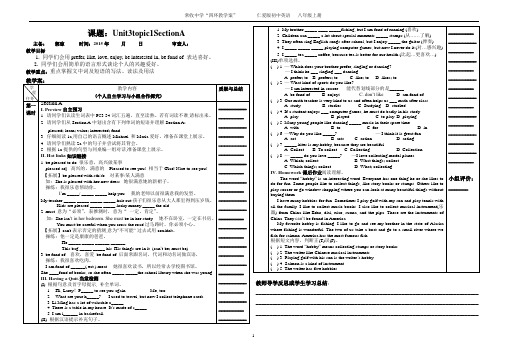
如:She is pleased with her new dress.她很满意她的新裙子。
操练:我很乐意帮助你。
I’m _____/ _____ _____ help you.我的老师以前很满意我的发型。
My teacher _____ _____ _____ _____ hair cut.孩子们很乐意从大人那里得到压岁钱。
A. actB. actsC. actionD. acting
( ) 7. _____ kites is my hobby, because they are beautiful.
A. CollectB. To collect C. CollectingD. Collection
( ) 8. — _____ do you love _____? —I love collecting model planes.
A. Which; collectB. What things; collect
C. Which things; collectD. What; collecting
IV. Homework课后作业阅读理解。
The word “hobby” is an interesting word. Everyone has one thing he or she likes to do for fun. Some people like to collect things, like story books or stamps. Others like to play soccer or go window shopping where you can look at many beautiful things without buying them.
仁爱科普版七年级英语下册导学案

仁爱科普版七年级英语下册导学案全文共5篇示例,供读者参考仁爱科普版七年级英语下册导学案篇1七年级学生学习英语的兴趣比较高,但是基础比较差,两级分化严重。
七年级的学生,由于年龄小,又加上生性活泼好动,喜欢直观形象思维,对游戏、竞赛、画画特别感兴趣。
在实际操作过程中,却有很多问题。
有的学生已经说得很好,有的学生可能说的不好,有的还不敢说,小学也对英语的重视程度不高且参差不齐,学生一开始对英语还有兴趣,但随着英语知识的深入,这种兴奋往往会很快地减退,还很容易产生厌学情绪。
因此最后能有一定英语基础的学生并不多。
老师针对学生现状,在课堂上尽量以鼓励表扬为主,注重培养学习英语的兴趣,营造学英语的氛围,鼓励学生开口说英语、特别是给差生创造机会,让他们尝试成功的喜悦。
另一方面,学生有一定的分化,但也不是全部都差,没基础。
麻烦的是,也有不少对语言学习接收较快的学生,对英语学习特别感兴趣的'学生,他们到六年级结束时,英语知识已经达到了一定的水平。
有些甚至已经把八年级要学的内容也掌握了一部分。
换句话说,现在七年级的学生的英语水平分化得更早,更大。
这对于七年级的教师的教学来说是相当困难的,并且这种困难从教学字母就开始了。
可想而知,面对那些连字母、你我他、be动词也理解不了的同学,老师不可能放弃他们,只能一遍又一遍的重复和练习,而此时那些已经具有大量英语基础知识的学生面对这样的同学和老师的教学,一开始或许还有一种自豪感,但很快便会十分无聊而影响课堂。
因此在初学阶段,教师大多希望这些孩子还不如全部都没有一点基础。
一、所以针对以上情况,采取以下措施:1、及时帮助,以防为主初中英语的教学重点是基础知识和基本技能,因此教学应面向全体同学,争取做到人人基本达标。
在教学过程中学生学习出现差距是不可避免的。
一旦出现,就应该及时找学生谈,分析他们掉队的原因,课下及时找她们谈话,了解她们的内心想法。
同时给予学习方法的指导,耐心帮助他们补习功课。
仁爱版英语七年级上全册导学案

Unit 1 Making New FriendsTopic 1 Welcome to China!Section A (第一课时)一、预习目标:1.知识(1)了解语音在语言学习中的意义。
(2)学习字母A ---G 及单词和短语(3)学习并掌握用英语表达问候:1)Good morning! 2)Nice to meet you ! 3) Welcome to China ! 及自我介绍及认识他人的交际用语。
(4)激发学习英语的兴趣。
二、学习重点:1、培养学生学习英语的兴趣和信心。
鼓励学生积极大胆,敢于模仿,克服不愿或羞于开口的心理。
使学生乐于接触并了解异国文化。
2、字母A ---G。
三、学习难点及突破策略:学习难点:用英语表达问候及自我介绍。
突破策略:模拟对话练习。
四、预习导学:一、走入新课:1. 借助肢体语言和大家一起学习领会招呼语“Good morning!”,“Hi!”和“Hello!”。
2. 拿出点名册走到一位新同学前面说:“Are you Wang Lin?”引导该同学感悟出:“Yes , I am./ No ,I’m not.”。
3.设想一个外国人到我们学校来参观,如何问候他们呢?老师先走上前和对方握手说:Nice to meet you!和Welcome to China!引导对方说:Nice to meet you!too.和Thanks./Thank you.二、阅读提示1:1.听1a和 3a.,学会并听懂“Good morning!”,“Hi!”,“Hello!”,“Are you…?”,“Yes ,I am./ No ,I’m not.”。
2.读1a和 3a.并且理解 1a 和 3a.的意思。
3.找出不懂的其它词汇:____________________________________________________________ ______________________________________________________________________ __________4.听1a和 3a后,学会自我介绍用:I am……三、阅读提示2:再读1a和 3a.,连线下列句子,然后核对答案。
仁爱版八年级英语(上册)导学案
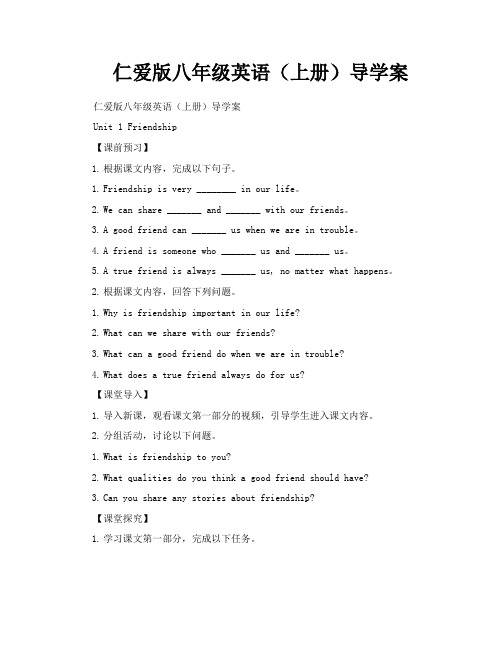
仁爱版八年级英语(上册)导学案仁爱版八年级英语(上册)导学案Unit 1 Friendship【课前预习】1.根据课文内容,完成以下句子。
1.Friendship is very ________ in our life。
2.We can share _______ and _______ with our friends。
3.A good friend can _______ us when we are in trouble。
4.A friend is someone who _______ us and _______ us。
5.A true friend is always _______ us, no matter what happens。
2.根据课文内容,回答下列问题。
1.Why is friendship important in our life?2.What can we share with our friends?3.What can a good friend do when we are in trouble?4.What does a true friend always do for us?【课堂导入】1.导入新课,观看课文第一部分的视频,引导学生进入课文内容。
2.分组活动,讨论以下问题。
1.What is friendship to you?2.What qualities do you think a good friend should have?3.Can you share any stories about friendship?【课堂探究】1.学习课文第一部分,完成以下任务。
1.阅读课文第一部分,并完成下面的练习。
a) 用自己的话总结出这部分的主要内容。
b) 在文中找出表示原因的句子,并写出原因。
c) 找出文中的两个意思相同的词组。
2.配对合作,完成课本练习。
仁爱英语八上导学案

Unit 1 Playing SportsThe school sports meet is coming.Section A导学案Teaching objectives: talk about school sports meet.the future tense with “will”.Key points : Objective1&2Difficult point: Objective2Step1 导入Lead inLet's talkWhat are you going to do this weekend?Why ?Great! I will come to cheer you on!Will you take part in it?Step2 呈现Presentation Phrases &Sentences1为某人加油2参加,加入某项活动(三种)3 跳高4跳远5为…做准备6接力赛7一双跑步鞋8谈论某事9某人第一次做某事 1 0运动会11男子800米赛跑12与某人交朋友13校园运动会将要来了。
14你将会参加哪一项运动会?男子800米赛跑。
15我将会参加跳高和跳远。
16这是我第一次参加跳高比赛。
Step3 DiscussPractice 1a with your partnerDiscuss in groups and make a survey.Will you take part in school sports meet? What will you do ? Why?1.the sports meet/meeting运动会the boys' 800一meter race男子800米赛跑the long jump跳远the high jump跳高the relay race接力赛跑2.It's the/one's first/second/…time to do sth.3.make friends with sb.与某人交朋友。
仁爱英语七年级下导学案unit6topic3

仁爱英语七年级下导学案Unit 6 Topic 3 SectonA一、课堂导学(本课必背单词、短语、句型)I.单词:1.沿着2.转弯3.十字路口4.米5.横过,穿过6.桥II.短语:1.沿着……走go along2.到达get to3.向左/右转turn left/right4.在第一个路口at the first crossing5.过桥go across the bridge6.去……的路the way to...7.在……的拐角处on the corner of the street8.在...对面across from9.在……和……之间between...and...10.在中山路on Zhongshan RoadIII.句型:1.问路1)Excuse me, is there a bank near here打扰一下,请问这儿附近有一家银行吗2)Excuse me, How can I get to the library打扰一下,请问我怎样才能到达图书馆 3)Excuse me, Which is the way to the hospital打扰一下,请问去医院的路是哪一条2.指路1 Go up Xinhua Street to the end ,and you’ll find it on your left .沿着新华街一直走到尽头,在你的右边你就会找到它。
2 Go along Xinhua Street and turn right at the first crossing.沿着新华街一直走,在一个十字路口向右转。
3 It’s about twenty meters along on the left. 它就在靠左边大约20米的地方。
4 Turn left and go across the ’s on your right.向左转,过桥,它就在你的右边。
二、课堂导练I.根据句意及首字母提示,填入恰当的单词。
仁爱英语导学案

张庄乡一中八年级英语上学期导学案编号 28主备人:高青银复备人:姜文娟储卫霞审核人:石玉峰备课时间: 2014.11.19 授课人:授课时间:姓名小组班级审核人石玉峰课题Unit3 Topic 1 What’s your hobby? 课时Section D 课型新授学习目标1.预习本课单词及词组。
2.学习使用形容词描述自己的宠物,学会珍爱小动物。
学法指导重点难点whether conj. 是否,常加在谓语动词之后,和or not 构成宾语从句。
e.g.: I don’t know whether I should go or not.我不知道我是否该去。
自主学习问题探究在文中找出下列短语,并翻译:①他皮肤的颜色__the color_____________________________ ②带他出去散步_____________________ 就像一个小朋友________________________【拓展】何为宾语从句?所谓从句,就是从一个句子来做另一个句子的一个成分,如主语、宾语、定语等。
如果做宾语就叫做宾语从句。
如:I hope you will win this game. 我希望你将赢得这次比赛在上一句中的you will win this game. 这个句子是整个大句子的宾语,就是一个宾语从句。
whether 是宾语从句常用的一个引导词,带有“是否”的含义,当用whether 时,常在句尾加上or not. 构成whether … or not. 的句型。
如:I can’t tell whether it’s a good idea or not. 我不知道这是否是一个好主意。
请翻译下面的句子:你知道他是否会加入我们吗?_____________________________________________________第二部分课堂任务I 1a,听录音补全短文。
习语:light pink _________________ take a bath ________________ II 1b 用方框中的给出的词回答下面的问题。
仁爱版八年级英语上册导学案(全册)

仁爱版八年级英语导学案Unit1 Playing sportsTopic1 Are you going to play basketball? Section A学习目标:1.掌握Page1—2的单词,重点短语及句型。
2.熟练掌握“be going to +动词原形”的结构表示的一般将来时。
3.积极、主动的参与课堂。
学习重难点:1.一般将来时来时概念:表示将要发生的动作或存在的状态及打算、计划或准备做某事。
基本结构:be going to + do(动词原形);.句中一般有以下时间状语:(后tomorrow, next day(week, month, year…),soon, the day after tomorrow 天)等。
否定句:在be动词(am, is, are)后加not;一般疑问句:be提到句首,some改为any, and改为or,第一二人称互换。
例如:I’m going to have a picnic this afternoon.not going to have a picnic this afternoon.→ I’mWe are going to go on an outing this weekend.→ Are you going to go on an outing this weekend?2. see sb do sth “看见某人做某事” 表示看见事件、行动的全过程,动作已经结束。
看见某人正在做某事”强调事件正在进行。
see sb doing sth “3.have a … game against … “同…进行一场…比赛”4.cheer…on “为某人加油(喝彩)”5.-- Would you like to do sth?-- Sure, I’d love to.6. Me,too.自学引导:1、自学Page1-2的单词。
(根据音标拼读、拼写单词并牢记)。
仁爱英语八年级上册英语导学案
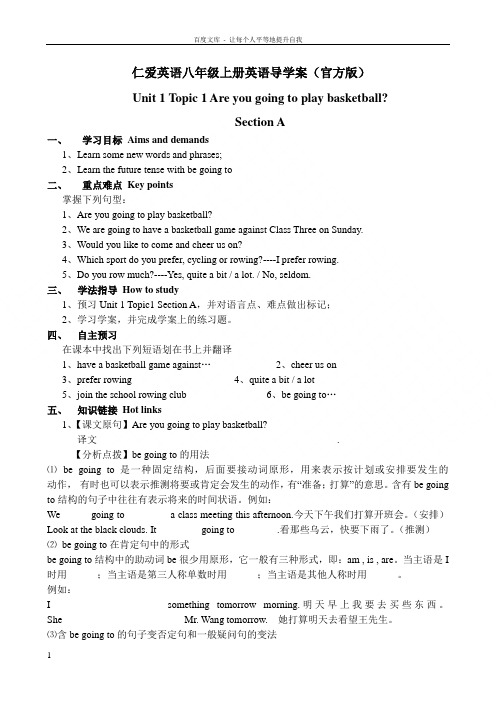
仁爱英语八年级上册英语导学案(官方版)Unit 1 Topic 1 Are you going to play basketball?Section A一、学习目标Aims and demands1、Learn some new words and phrases;2、Learn the future tense with be going to二、重点难点Key points掌握下列句型:1、Are you going to play basketball?2、We are going to have a basketball game against Class Three on Sunday.3、Would you like to come and cheer us on?4、Which sport do you prefer, cycling or rowing?----I prefer rowing.5、Do you row much?----Yes, quite a bit / a lot. / No, seldom.三、学法指导How to study1、预习Unit 1 Topic1 Section A,并对语言点、难点做出标记;2、学习学案,并完成学案上的练习题。
四、自主预习在课本中找出下列短语划在书上并翻译1、have a basketball game against…____________2、cheer us on ______________3、prefer rowing ________________4、quite a bit / a lot____________5、join the school rowing club______________6、be going to…______________五、知识链接Hot links1、【课文原句】Are you going to play basketball?译文________________________________________________.【分析点拨】be going to的用法⑴be going to是一种固定结构,后面要接动词原形,用来表示按计划或安排要发生的动作,有时也可以表示推测将要或肯定会发生的动作,有“准备;打算”的意思。
仁爱版英语导学方案 U5T2SA

Practice16’
dation
Report5’
Work in groups3’
Work alone
8’
1. Listen to the reporting carefully and give some cue, advice or explanation when it is necessary or discuss with the students together. Request the students to do some note if it is necessary and request them to get a habit of doing notes while others reporting gradually.
3. Join the students while they are reading and listen carefully, especially pay more attention to the weak students.
4. Listen to the reporting carefully.
Report6’
1. Present the learning goals in this class.
2. Play the tape of1atwice, one is for answering the question and the other is for practicing reading.
S1: The mother went mad at last!
S1: Because it’s very moving.
仁爱版八年级英语上册导学案(完整修改版)

仁爱版八年级英语上册导学案(完整修改版)Unit 1 Playing SportsTopic 1: Are You Going to Play Basketball?n AXXX:1.Master the words。
key phrases。
and sentence structures on Pages 1-2.2.Proficiently grasp the structure of "be going to + verb" to express the simple future tense.Key Points:1.Simple XXXConcept: XXX future。
ns。
plans。
or ns。
Basic structure: be going to + do (verb)。
XXX。
next day (week。
month。
year。
)。
soon。
the day after tomorrow。
etc.Negative form: add "not" after the auxiliary verb "be" (am。
is。
are).General n: move the auxiliary verb "be" to the beginning ofthe sentence。
change "some" to "any," "and" to "or," and swap the first and second person.For example: I'm going to have a XXX.I'm not going to have a XXX.We are going to go on an outing this weekend.Are you going to go on an outing this weekend?2."see sb do sth" means "XXX" and refers to the entire process of the event or n that has already ended.XXX" emphasizes that the event is XXX.3."have a。
仁爱版七年级英语导学案Unit5Topic1SectionB
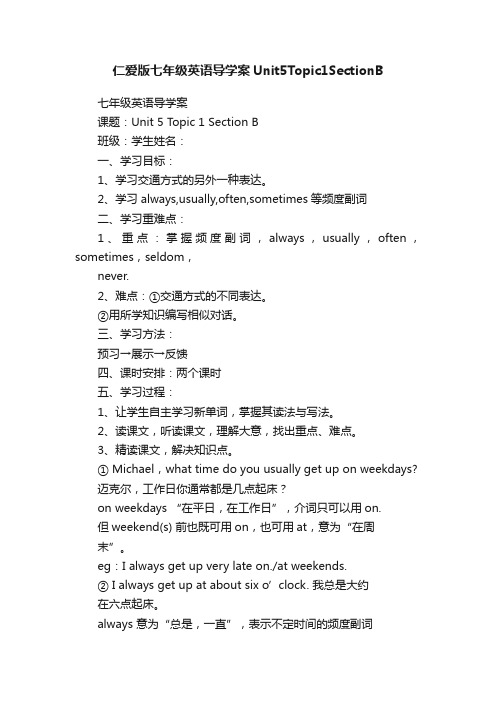
仁爱版七年级英语导学案Unit5Topic1SectionB七年级英语导学案课题:Unit 5 Topic 1 Section B班级:学生姓名:一、学习目标:1、学习交通方式的另外一种表达。
2、学习always,usually,often,sometimes等频度副词二、学习重难点:1、重点:掌握频度副词,always,usually,often,sometimes,seldom,never.2、难点:①交通方式的不同表达。
②用所学知识编写相似对话。
三、学习方法:预习→展示→反馈四、课时安排:两个课时五、学习过程:1、让学生自主学习新单词,掌握其读法与写法。
2、读课文,听读课文,理解大意,找出重点、难点。
3、精读课文,解决知识点。
① Michael,what time do you usually get up on weekdays?迈克尔,工作日你通常都是几点起床?on weekdays “在平日,在工作日”,介词只可以用on.但weekend(s) 前也既可用on,也可用at,意为“在周末”。
eg:I always get up very late on./at weekends.② I always get up at about six o’clock. 我总是大约在六点起床。
always 意为“总是,一直”,表示不定时间的频度副词还有,usually(通常),often(经常),sometimes(有时),seldom(很少),never(从不), about 副词,意为“大约,大概”,此外还可以做介词,意为“关于”。
如:a book about English 一本有关于英语的书③ Maria sometimes takes the subway home. 玛利亚经常乘地铁回家。
take the subway“乘地铁”一般情况下乘坐某种交通工具有两种表达方式⑴ by+表示交通工具的单数名词⑵ take+a/an/the+表示交通工具的单数名词例如:take the subway = by subway “乘地铁”【拓】in/on +a(an)/the/this/that/one’s/…+表示交通工具的单数名词用上述句型,同样可以表示乘坐某种交通工具。
导学案仁爱英语八年级上册
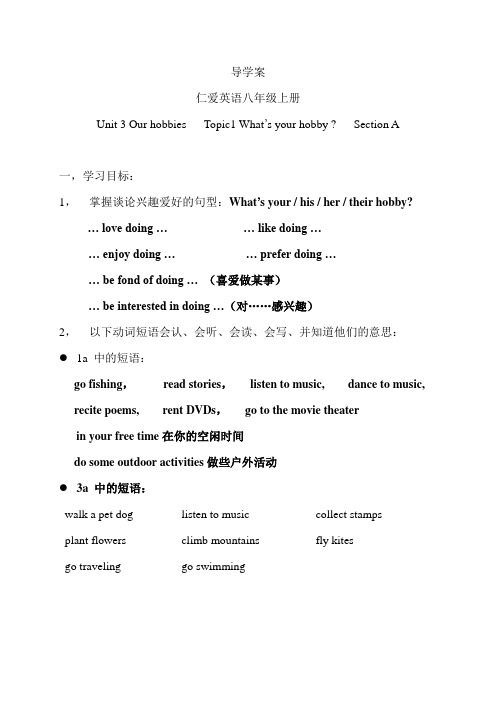
导学案仁爱英语八年级上册Unit 3 Our hobbies Topic1 What’s your hobby ? Section A一,学习目标:1,掌握谈论兴趣爱好的句型:What’s your / his / her / their hobby?… love doing …… like doing …… enjoy doing … … prefer doing …… be fond of doing …(喜爱做某事)… be interested in doing …(对……感兴趣)2,以下动词短语会认、会听、会读、会写、并知道他们的意思:●1a 中的短语:go fishing,read stories,listen to music, dance to music, recite poems, rent DVDs,go to the movie theaterin your free time在你的空闲时间do some outdoor activities做些户外活动●3a 中的短语:walk a pet dog listen to music collect stampsplant flowers climb mountains fly kitesgo traveling go swimming二,达成目标:◆用我们学过的句型,两人一组进行对话,先互问对方的兴趣爱好,再谈论上图康康等四人的兴趣爱好。
(小组比赛,表演对话加2分)A: Wh at’s your hobby?B: I am interested in……/I am fond of……/ I like / love / prefer / enjoy……A: What’s Kangkang’s hobby? He……◆第56页,图2,看图片,听录音,完成以下句子。
1. I love________ and playing the guitar.2. I am interested in __________________.3. I enjoy _______ to music.4. I like _________.5. I like _________poems.6. I am fond of _______ .7. I prefer ____________.◆第55页,1c, 听录音后,看图互问互答式谈论海伦和温伟的兴趣爱好。
仁爱英语七年级下册unit5 topic1 section a b公开课导学案教学文案
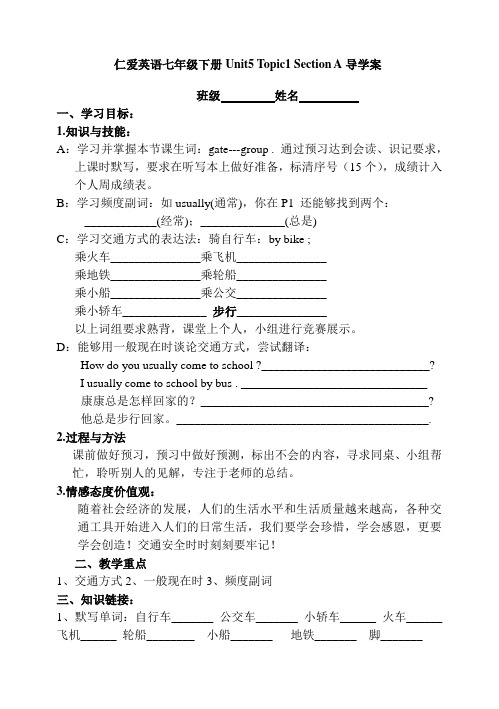
仁爱英语七年级下册Unit5 Topic1 Section A导学案班级姓名一、学习目标:1.知识与技能:A:学习并掌握本节课生词:gate---group . 通过预习达到会读、识记要求,上课时默写,要求在听写本上做好准备,标清序号(15个),成绩计入个人周成绩表。
B:学习频度副词:如usually(通常),你在P1 还能够找到两个:____________(经常);______________(总是)C:学习交通方式的表达法:骑自行车:by bike ;乘火车_______________乘飞机_______________乘地铁_______________乘轮船_______________乘小船_______________乘公交_______________乘小轿车______________ 步行_______________以上词组要求熟背,课堂上个人,小组进行竞赛展示。
D:能够用一般现在时谈论交通方式,尝试翻译:How do you usually come to school ?____________________________?I usually come to school by bus . _______________________________康康总是怎样回家的?______________________________________?他总是步行回家。
__________________________________________. 2.过程与方法课前做好预习,预习中做好预测,标出不会的内容,寻求同桌、小组帮忙,聆听别人的见解,专注于老师的总结。
3.情感态度价值观:随着社会经济的发展,人们的生活水平和生活质量越来越高,各种交通工具开始进入人们的日常生活,我们要学会珍惜,学会感恩,更要学会创造!交通安全时时刻刻要牢记!二、教学重点1、交通方式2、一般现在时3、频度副词三、知识链接:1、默写单词:自行车_______ 公交车_______ 小轿车______ 火车______飞机______ 轮船________ 小船_______ 地铁_______ 脚_______2、写出下列动词的三单形式A. come _______ look_______ work_______ live _______B. guess_______teach_______dress_______ watch______ catch_______C. try _______study _______carry_______ fly _______D. go _______do _______have_______ be _______3、补全对话:A: Nice to see you again ! B: ________________________!A: Your new bike looks very new !B:___________________!A: Happy birthday !B:_________________!A: Happy New Year ! B:___________________!三、学习内容:Step1 : Read 1a . 理解并翻译下列词组或句子1.at the gate2.Happy New Year ! The same to you !3.look very nice .4.by bike by subway by bus5.How about ….? = _______________?6.It’s time for class !=___________________!7.It’s time _____ sth = It’s time ____ _____ sth .8.It’s time ____sb ____ sth . – It’s time ___ sb ___ ____ sth .四、学习小结:1.交通工具的表达法:+表示交通工具的名词原形.2.对交通工具的提问用:_____+助动词+主语+频度副词+动词短语?回答:主语+频度副词+动词短语+by交通工具.3. 当节日属于大家共同拥有时,面对别人的祝贺我们应该说:_____________!当节日属于你个人拥有时,面对别人的祝贺你应该说:_____________!五、达标检测:(一)根据句意和首字母提示完成句子1. My mother o_______ goes to work by bus .2.They a_______ play games after school .3. They are brothers , they look the s________.4. It’s a long way , you must go there by t____________.(二) 单项选择题( )1.Happy New Year ! ________________!A.Thank you !B. You are right !C. The same to you !D. Sorry ! ( )2. ___ do you usually have lunch ? At school .A. WhenB. WherC. HowD. Why( )3. How are you going to the Summer Palace ?We are going there ____ bike .A. forB. atC. ofD. by( )4. _____ do you usually go to your office ? ——By bus .A. How oftenB. What timeC. WhenD. How( )5. It’s five o’clock . It’s _____ go home .A. time toB. time forC. timeD. time to go to( )6. Kangkang’s new shoes look _________.A. happyB. wellC. niceD. the same( )7. ___________________ ?——It’s half past six.A. What’s the o’clockB. What’s the time is.C. What time is itD. What’s the time is it( )8. Hi, Li Ming , your book is very interesting (有趣). ——_________.A.Thank you .B. Don’t say so !C. That’s rightD. You are right( )9. I usually take the subway to school . __________?——I usually go to school by bus .A. How are youB. How do youC. What do youD.How about you (三)对划线部分提问1. Jane usually goes to school by subway .2. They always go to work by bus.六.学后记:仁爱英语七年级下册Unit5 Topic1 Section B导学案班级姓名一、学习目标:1、知识与技能:A:学习并掌握本节课生词:weekday --- park 要求:熟读、识记会默写,在听写本上做好准备,上课默写。
仁爱英语九年级上册导学案
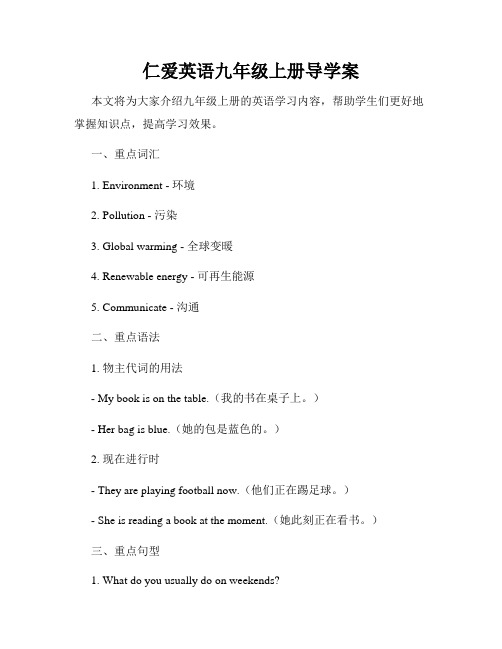
仁爱英语九年级上册导学案本文将为大家介绍九年级上册的英语学习内容,帮助学生们更好地掌握知识点,提高学习效果。
一、重点词汇1. Environment - 环境2. Pollution - 污染3. Global warming - 全球变暖4. Renewable energy - 可再生能源5. Communicate - 沟通二、重点语法1. 物主代词的用法- My book is on the table.(我的书在桌子上。
)- Her bag is blue.(她的包是蓝色的。
)2. 现在进行时- They are playing football now.(他们正在踢足球。
)- She is reading a book at the moment.(她此刻正在看书。
)三、重点句型1. What do you usually do on weekends?(你周末通常做什么?)2. How do you go to school every day?(你每天怎么去学校?)四、练习题1. 用所给词的适当形式填空:(1)The earth is in great danger because of (pollute).(2)We should use more (renew)energy to protect the environment.2. 根据提示完成句子:(1)I usually (watch TV)in the evening.(2)They (play)football on the playground now.五、阅读理解阅读下面的短文,然后回答问题。
Global warming is a serious problem. It means our world is becoming warmer. This is because we are burning too much coal, oil and gas. These things give off a gas called carbon dioxide. This gas goes up in the sky like a big blanket and stops the heat from going out. The heat gets trapped (困住) and this makes the world warmer.1. What does global warming mean?2. Why is the world becoming warmer?3. What gas is given off when we burn coal, oil and gas?六、作文请写一篇80词左右的短文,描述你的周末计划。
仁爱英语七年级下导学案Unit6Topic1导学案.docx

Unit 6 Our Local AreaTopic 1 There is a studynext to my bedroom?n ・短语l. on the second floor 在二楼2. next to 紧挨着,在…隔壁3.in your study 在你的书房4. and so on 等等 5・Why not …=Why don't you …为什么不 6.go upstairs 上楼III.句型:1 •玛利亚,欢迎到我的新家来。
my new home, Maria ・2•你的卧室在哪儿? your bedroom?它在二楼。
紧挨着我的卧室有一个书房。
Ifs.There is a study to my bedroom.3•在你的书房有什么? in your study?有一个沙发,一张课桌,一些书等等。
is a sofa ,a desk, some books •4. 为什么不上楼看一看呢?Why not and ?5•在你家里有哪种房间? rooms are there in your home? 有一个客厅,一个卧室,一个厨房,一个聶厅等等.There is a living room,a bedroom^a dining room and so on.IV •难点解析:l. Why not go upstairs and have a look?为什么不上楼看一看呢? have a look 看一看,瞧一瞧当其后跟宾语时必须带上at.链接:英语中很多动词可以做名词,构成“have+a+名'词”,如: ride have aride 骑车 swim ...................................... h ave a ______ 游泳walk ........ h ave a _____ 散步 sleep ............. have a ______ 睡觉rest .... have a 休 息 talk ........ have a _____ 谈一谈 二.课堂导练:I. 根据短文矗意思及首字母提示补全单词;This is my new house ・ There is a big g next to my house.My home is veryb. It has two f ______ . My mother often cooks for us in the k. I usually watchingTV in the 1 room for a short time after supper. Then I go u and do myhomework in my s _____ . At 9:30 p.m. I usually go to bed in my b ・II. 根据汉语提示,完成句子。
仁爱版初中英语七年级(上册)(全册)导学案(75页)
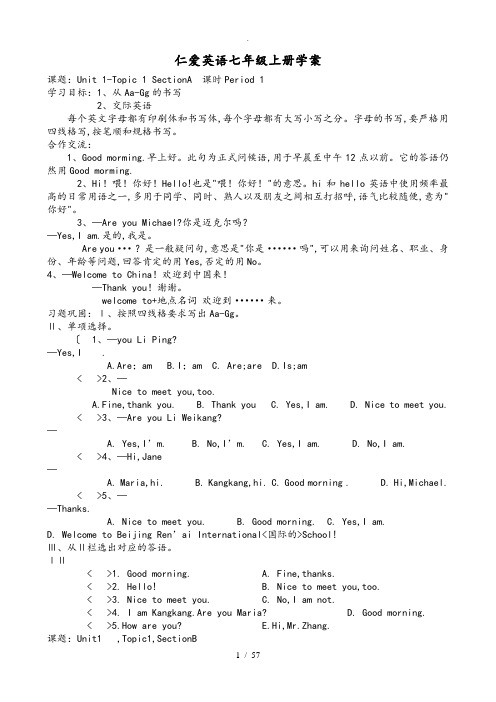
仁爱英语七年级上册学案课题:Unit 1-Topic 1 SectionA 课时Period 1学习目标:1、从Aa-Gg的书写2、交际英语每个英文字母都有印刷体和书写体,每个字母都有大写小写之分。
字母的书写,要严格用四线格写,按笔顺和规格书写。
合作交流:1、Good morming.早上好。
此句为正式问候语,用于早晨至中午12点以前。
它的答语仍然用Good morming.2、Hi!喂!你好!Hello!也是"喂!你好!"的意思。
hi和hello英语中使用频率最高的日常用语之一,多用于同学、同时、熟人以及朋友之间相互打招呼,语气比较随便,意为"你好"。
3、—Are you Michael?你是迈克尔吗?—Yes,I am.是的,我是。
Are you···?是一般疑问句,意思是"你是······吗",可以用来询问姓名、职业、身份、年龄等问题,回答肯定的用Yes,否定的用No。
4、—Welcome to China!欢迎到中国来!—Thank you!谢谢。
welcome to+地点名词欢迎到······来。
习题巩固:Ⅰ、按照四线格要求写出Aa-Gg。
Ⅱ、单项选择。
〔 1、—you Li Ping?—Yes,I .A.Are;amB.I;amC. Are;areD.Is;am< >2、—Nice to meet you,too.A.Fine,thank you.B. Thank youC. Yes,I am.D. Nice to meet you. < >3、—Are you Li Weikang?—A. Yes,I’m.B. No,I’m.C. Yes,I am.D. No,I am.< >4、—Hi,Jane—A. Maria,hi.B. Kangkang,hi.C. Good morning .D. Hi,Michael. < >5、——Thanks.A. Nice to meet you.B. Good morning.C. Yes,I am.D. Welcome to Beijing Ren’ai International<国际的>School!Ⅲ、从Ⅱ栏选出对应的答语。
仁爱版英语八年级Unit7Topic1SectionA公开课导学案
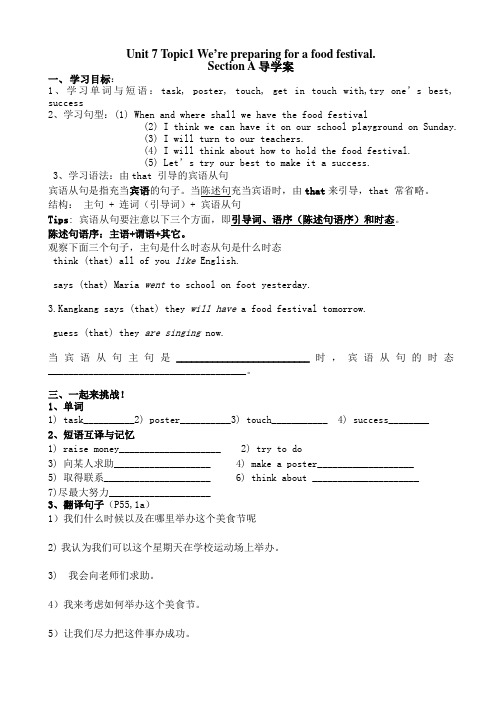
Unit 7 Topic1 We’re preparing for a food festival.Section A导学案一、学习目标:1、学习单词与短语:task, poster, touch, get in touch with,try one’s best, success2、学习句型:(1) When and where shall we have the food festival(2) I think we can have it on our school playground on Sunday.(3) I will turn to our teachers.(4) I will think about how to hold the food festival.(5) Let’s try our best to make it a success.3、学习语法:由that 引导的宾语从句宾语从句是指充当宾语的句子。
当陈述句充当宾语时,由that来引导,that 常省略。
结构:主句 + 连词(引导词)+ 宾语从句Tips: 宾语从句要注意以下三个方面,即引导词、语序(陈述句语序)和时态。
陈述句语序:主语+谓语+其它。
观察下面三个句子,主句是什么时态从句是什么时态think (that) all of you like English.says (that) Maria went to school on foot yesterday.3.Kangkang says (that) they will have a food festival tomorrow.guess (that) they are singing now.当宾语从句主句是__________________________时,宾语从句的时态_______________________________________。
仁爱版七年级英语上册导学案:Unit 3 Topic 1-Section D.

Unit 3 Getting Together Topic 1 Does he speak Chinese?Section D 【学习目标】1、学习的任务和目标:1.知识1)继续复习一般现在时。
2)复习人称代词的用法2.方法:对话法练习一般现在时的构成3.情感通过描述个人的喜好教育学生要热爱生活。
2、学习的重点:一般现在时和人称代词的用法。
3、学习的难点:一般现在时和人称代词的用法。
【学习过程】Step 1: 自主学习----明确目标自学文本1. 请同学们课前上平台阅读思考本节导学案,明确本节课的学习任务和目标。
2. 对照课本后面第三单元的单词表跟读单词录音。
要求:根据录音及单词音标,首先会读单词接着边读边写记单词,注意中英文的转换,最后默写单词。
3. 独立认真地预习课文。
要求:阅读课文,把不理解的短语,句子用红笔做上记号。
4. 在线上对照导学案本课时完成探究归纳部分的预习。
5. 请大家带着问题自学本课时的两个微课视频。
Step 2: 自学检测----在线测学质疑思学1. 学生独立完成导学案上的自学检测。
2. 学生在线上提交客观题的答案。
3. 对照正确的答案对错题进行反思,质疑。
1. 通过自学完成下列任务:自学检测题一. 根据句意及汉语提示完成句子1. Many (人们) from China can speak English well now.2. Tony often (朗读)books in the morning.3. I have many friends, and (每个)friend is very good.4. We are happy each (一天).5. Carla likes China very much. She wants to (参观) her.二. 单项选择( ) 1. — Lisa is a nice girl.— Yes. And often helps with my English.A. She; IB. her; meC. she; meD. hers; my ( ) 2. — Are Michael and Kangkang in the same grade?— Yes. But are in different classes.A. themB. theirC. weD. they( ) 3. — Zhang Ming speak English?— No, he .A. Is; isn’tB. Does; doesn’tC. Do; don’tD. Are; ar en’t ( ) 4. — Can you help me carry(搬)these books?—A. That’s right.B. That’s OK.C. That’s all right.D. No problem. ( ) 5. —What’s her sisters name?—name is Lucy.A. HerB. She’sC. SheD. Hers【知识探究】知识点一1.人称代词用法口诀:人称代词分两格,主格宾格来分说;主格定把主语作,宾格作宾不会错。
- 1、下载文档前请自行甄别文档内容的完整性,平台不提供额外的编辑、内容补充、找答案等附加服务。
- 2、"仅部分预览"的文档,不可在线预览部分如存在完整性等问题,可反馈申请退款(可完整预览的文档不适用该条件!)。
- 3、如文档侵犯您的权益,请联系客服反馈,我们会尽快为您处理(人工客服工作时间:9:00-18:30)。
Unit 3 Topic 1 English is widely spoken throughout the world
Section A
学习目标:
1.掌握以下单词:cartoon,character, widely, throughout 短语:from now on ,
be pleased with
句型:Disneyland is enjoyed by millions of people from all over the world.
I can’t wait to fly there!
Try your best and work much harder from now on.
2.掌握一般现在时的被动语态的用法:am/is /are+动词的过去分词
3.了解有关迪斯尼(Disneyland)的知识,特别是米老鼠(Mickey Mouse)和唐老鸭
(Donald Duck)的故事,扩大知识面。
学习重难点:一般现在时的被动语态的用法。
学习过程:
Ⅰ.快乐预习(Preview)
1.研究本话题的标题,并将其翻译成中文。
widely . throughout .
中文: .
2.观察课本p55上的图片,你知道图片中的卡通人物(cartoon characters)吗?
你还知道哪些迪斯尼(Disneyland)的卡通人物呢?
Ⅱ.自主学习(Independent learning)
1.听1a,完成1b。
2.翻开书,听1a检测1b部分的答案。
3.大声朗读并圈出文章中的生词和短语,结合上下文猜测它们的意思。
will be able to do sth.
(表能干某事,可以用can do, 但情态动词can 只有一般现在时,和一
般过去式could do, 表将有能力干某事只能用will be able to do. )
be pleased with . have a good chance to do .
can’t wait to do sth. . from now on .
Ⅲ.合作探究(Group Work)
1.再读1a完成1c的填空题。
2.在读的过程中找出文章中含有被动语态的句子。
1)
2)
3)
3. 研究2a中的两个例句,完成课本上的的练习。
They make bikes. .
Bikes are made by them. .
4.根据以上学习可以总结出一般现在时的被动语态的结
构: .
Ⅳ.小组释疑(Group Assessment)
Ⅴ巩固练习(Exercises)
English is spoken by Englishman.
…
Ⅵ.自我总结(Summary)。
